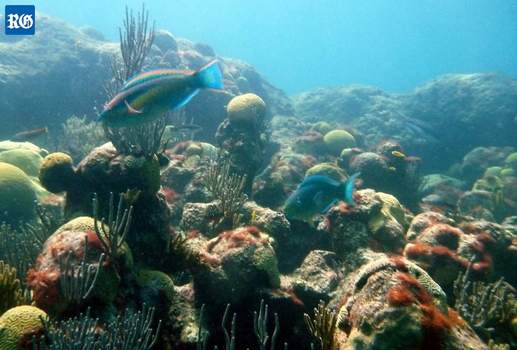Recent News
Santa Clause is coming to visit kids at BZSWednesday, December 03, 2014
Santa Claus will be on hand to visit with children at the Bermuda Zoological Society [BZS] on Saturday, December 6, 2014, with the fun getting underway at 10.00am. A professional photographer will be available to take photos of kids meeting Santa.
Tribute concert for Dr Burnie on Saturday
Tuesday, November 18, 2014
The spirit of Dr Neil Burnie was alive on Front Street today as his son Oscar played sax to promote a tribute concert taking place at Pier 6 on Saturday.
Photos: ‘Ocean Vet’ Dr. Burnie Laid To Rest
Monday, November 17, 2014
An entire flotilla of boats departed Albuoy’s Point on Sunday morning [Nov 16] as people from around the island made their way out onto the water in order to bid farewell to “Ocean Vet” Dr. Neil Burnie, who was buried at sea.
Dr Burnie given fitting ocean sendoff
Sunday, November 16, 2014
Dr Neil Burnie has been laid to rest, with his body placed in the water 600 fathoms deep at Western Blue Cut yesterday afternoon.
Dr Neil Burnie To Be Buried At Sea On Sunday
Friday, November 14, 2014
Dr. Neil Burnie will be buried at sea this coming Sunday [Nov 16], with boats set to leave Albuoys Point at about 10.00am, and anyone wanting to join in with their own boat is welcome to attend.
About
GovernanceAbout Us
Newsletter
Latest News
Gift & Bookstore
Contact
General Inquiries
info@bzs.bm
Latest News
All the latest updates and news from the Bermuda Aquarium, Museum, and Zoo, one of Bermuda's leading visitor attractions!
Sarah Lagan
Published May 17, 2018 at 8:00 am (Updated May 17, 2018 at 7:58 am)

Predatory fish numbers are at critically low levels, a new report has warned.
Major marine predators including groupers and snappers are endangered, a scientist has warned.
Thaddeus Murdoch, chief scientist at the Bermuda Reef Ecosystem Assessment and Mapping programme, added that if the problem is not dealt with, it is “highly likely” the island’s reef system will erode away.
Dr Murdoch explained that Bermuda’s low predator count had led to an explosion in the number of coral-killing damselfish, whose population has doubled in the area since 2010.
He added that had reduced reef quality across an area bigger than Bermuda’s landmass.
Dr Murdoch said: “Large predators like black grouper carry out important work by managing the numbers of small and large parrotfish on the reef.
“Smaller predatory fishes such as red hind, coney and grey snappers do much more than just provide a source of food, as they keep coral-killing damselfish from increasing and causing damage to reefs.”
He added: “Bermuda’s coral reefs protect the island, give us food and provide exciting experiences for locals and tourists alike.
“However, our reefs, along with those across the world, face destruction from an increasingly acidic ocean and increasingly violent storms.
“Our reefs can face these serious threats, but only when predatory fishes like grouper and snapper, as well as plant-eating fish like parrotfish and surgeonfish, are abundant, marine seaweeds are sparse, and hard corals are healthy.”
Dr Murdoch said: “We oversee the condition of our reefs as if they are primarily a fisheries concern. Reef condition is a tourism and coastal protection issue, and should be managed accordingly.”
He was speaking after the release of a report into the health of the island’s reefs and fish population in 2016 was released.
The report was prepared by Dr Murdoch and a team of researchers through the Bream programme.
Dr Murdoch said Bermuda could restore the predatory fish population by restrictions on the commercial and recreational catch of groupers and snappers and a limit on the sale of predators during spawning season. He added an expansion of the seasonal prohibition and increase in protected spawning areas where necessary, as well as improved marine resource enforcement would also help.
Dr Murdoch said: “Our centuries-old Bermuda reef fishery, and the multigenerational livelihoods that it provides, can only persist if we maintain the numbers of our breeding groupers and snappers.
“If we fail to protect our fish and coral reefs, then bigger waves will hit the shore, and our beaches will change from pink sand to rocky rubble.”
The report contained information collected from 2004 to 2011 and compared it to updated data collected by a fresh survey of the reefs in 2015 and 2016 by Dr Murdoch and his team.
Bream measured the amount of corals, marine plants, plant-eating fish and predatory fish at 38 reefs.
The Department of Environment and Natural Resources did not respond to a request for comment.
The Bream report is available at www.bermudabream.org


